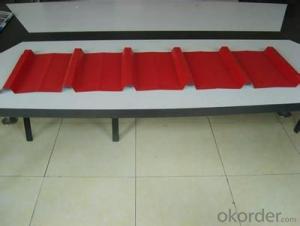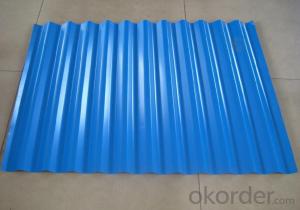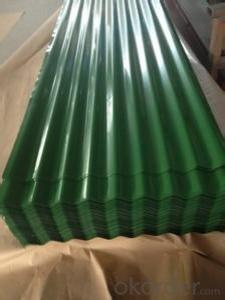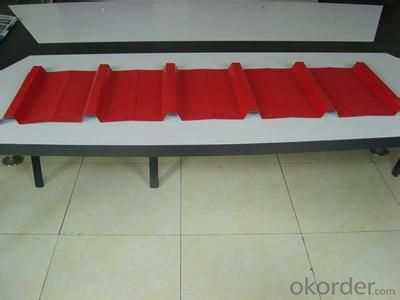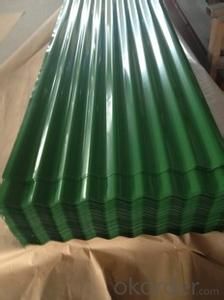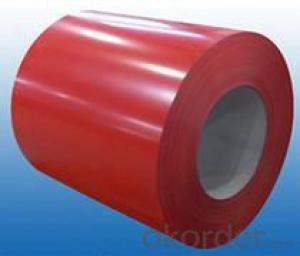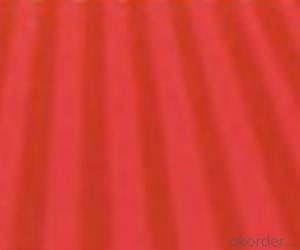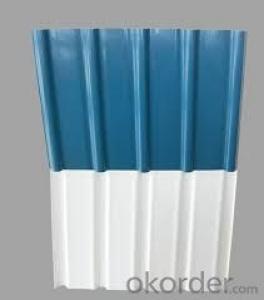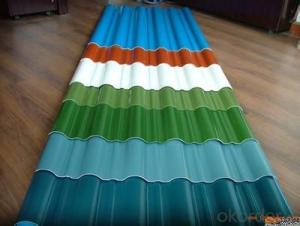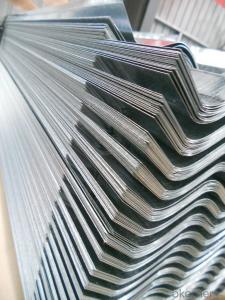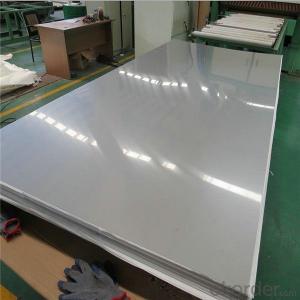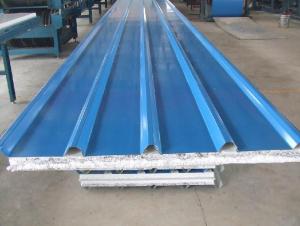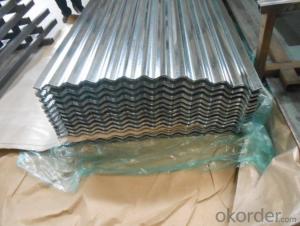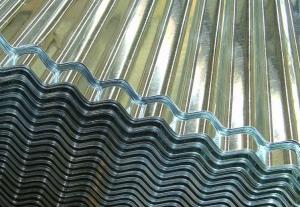COATED GALVANIZED STEEL CORRUGATED SHEETS
- Loading Port:
- Tianjin
- Payment Terms:
- TT OR LC
- Min Order Qty:
- -
- Supply Capability:
- 10000 m.t./month
OKorder Service Pledge
OKorder Financial Service
You Might Also Like
PRE-PAINTED GALVANIZED STEEL CORRUGATED SHEETS
THICKNESS:0.30mm/0.35mm/0.4mm
1.WIDTH:820mm (0/+5mm, AFTER CORRUGATION)
2.LENGTH:3000mm (0/+5mm), 5800mm (0/+5mm)
3.ZINC COATING:60g/m2
4.STANDARD:JIS G 3312, CGCC (SOFT QUALITY)
5.TOP COATING:5+15 MICRON(POLYESTER); BACK COATING:5-7 MICRON (EPOXY),LIGHT GREY
6.COLOR:RAL3013 (RED TOMATO)
7.PACKAGE WEIGHT:3-3.5tons
8.TOLERANCE: -/+5 % TOLERANCE WITH QTY AND AMOUNT (THICKNESS:-/+0.02mm; WIDTH:0/+5mm; ZINC COATING:-/+10g/m2; COATING MASS THICKNESS:-/+ 2 MICRON)
9.PROFILE IS ATTACHED TO BE CONFIRMED

- Q: Are steel sheets suitable for electrical grounding applications?
- Yes, steel sheets are suitable for electrical grounding applications. Steel is a good conductor of electricity and can effectively dissipate any electrical charges, making it an ideal material for grounding purposes.
- Q: What are the different sheet metal forming techniques for steel sheets?
- There are several different sheet metal forming techniques that can be used for steel sheets. These techniques are utilized to shape the metal into desired forms and structures. Some of the common sheet metal forming techniques for steel sheets include: 1. Bending: This is a widely used technique in which the sheet is bent to create angles, curves, or complex shapes. It can be done manually or by using machines such as press brakes. 2. Stretch forming: In this technique, the sheet is stretched and formed over a mold or die to create a desired shape. It is commonly used for large and curved components. 3. Deep drawing: This technique involves using a punch and a die to form a sheet metal into a desired shape. It is commonly used for creating cylindrical or box-like structures such as cans, pots, or automotive components. 4. Roll forming: Roll forming involves passing the sheet metal through a series of rollers to gradually shape it into a desired form. It is often used for producing long and continuous shapes such as rails, tubes, or channels. 5. Spinning: This technique involves rotating a sheet metal while shaping it against a mandrel using a spinning tool. It is commonly used for creating cylindrical or conical shapes such as lampshades or cookware. 6. Embossing: In this technique, the sheet metal is stamped with a pattern or design to create a raised or recessed surface. It is commonly used for decorative purposes or to improve the structural integrity of the sheet. 7. Hydroforming: Hydroforming utilizes hydraulic pressure to shape the sheet metal into complex forms. It is often used for creating automotive components such as car body panels or exhaust systems. These are just a few examples of the sheet metal forming techniques that can be used for steel sheets. The choice of technique depends on the desired shape, complexity, and requirements of the application.
- Q: How are steel sheets tested for quality?
- Steel sheets are tested for quality through a variety of methods to ensure they meet the required standards. One of the most common tests is the tensile strength test, which measures the maximum amount of stress a steel sheet can withstand before it breaks. This test is crucial as it determines the durability and reliability of the steel sheet in various applications. Another important test is the hardness test, which measures the resistance of the steel sheet to indentation or scratching. This is done using specialized tools such as a Brinell or Rockwell hardness tester. The hardness test helps determine the steel sheet's ability to withstand wear and tear, making it suitable for specific applications. The thickness of the steel sheet is also checked using a micrometer or ultrasonic thickness gauge to ensure it meets the required specifications. This is important as the thickness affects the sheet's strength and ability to withstand external forces. Furthermore, visual inspection is conducted to identify any surface defects, such as cracks, pits, or corrosion. This is done by trained professionals who carefully examine the steel sheet for any irregularities that might compromise its quality. Chemical composition analysis is another crucial test that determines the percentage of various elements present in the steel sheet. This analysis is performed using techniques like spectrometry or X-ray fluorescence to ensure the steel sheet meets the desired chemical requirements. Additionally, steel sheets may undergo tests such as impact testing, bend testing, and fatigue testing to assess their performance under specific conditions. These tests simulate real-world scenarios to ensure the steel sheet can withstand the anticipated loads and stresses it may encounter. Overall, steel sheets are rigorously tested for quality to ensure they meet the necessary standards, providing customers with reliable and durable products. These tests help manufacturers identify any potential flaws or defects, allowing them to rectify issues and deliver high-quality steel sheets to the market.
- Q: How are steel sheets protected during storage in outdoor environments?
- Steel sheets are protected during storage in outdoor environments through the application of various protective measures. These measures may include the use of weather-resistant coatings, such as galvanization or paint, to prevent corrosion and rusting. Additionally, steel sheets can be stored on pallets or racks to minimize contact with the ground and reduce the risk of moisture accumulation. Covering the sheets with tarpaulins or using weatherproof storage containers further shields them from direct exposure to rain, snow, and sunlight. Regular inspections and maintenance are crucial to ensure the effectiveness of these protective measures and to address any potential issues promptly.
- Q: How do steel sheets perform in corrosive environments like saltwater?
- Steel sheets can be prone to corrosion in saltwater environments due to the presence of chloride ions. However, their performance can vary depending on the type of steel and the protective measures taken. Stainless steel sheets, for example, contain chromium which forms a passive layer that prevents corrosion. Additionally, surface treatments such as galvanization or applying protective coatings can further enhance their resistance to corrosion in saltwater.
- Q: Can the steel sheets be easily formed into decorative panels?
- Indeed, decorative panels can be effortlessly crafted from steel sheets. Steel, being a flexible material, can be molded and shaped into diverse forms, including decorative panels. By utilizing appropriate tools and methodologies, steel sheets can be skillfully cut, bent, and manipulated to produce intricate and distinctive designs. Furthermore, steel possesses exceptional durability and longevity, rendering it a perfect choice for decorative panels that necessitate both visual allure and structural soundness. Whether it is for architectural objectives, interior design endeavors, or artistic installations, steel sheets can be readily transformed into visually captivating and functionally efficient decorative panels.
- Q: What is the difference between a steel sheet and a steel plate?
- The main difference between a steel sheet and a steel plate is their thickness. Steel sheets are generally thinner, ranging from 0.4mm to 6mm, while steel plates are thicker, typically starting from 6mm and can go up to several inches in thickness. Additionally, steel plates are often used for structural purposes or heavy-duty applications, while steel sheets are commonly utilized for lighter applications like roofing, cladding, or decorative purposes.
- Q: Can steel sheets be customized in terms of thickness?
- Indeed, thickness customization is possible for steel sheets. Steel sheets are produced in a variety of thicknesses to accommodate diverse applications and demands. The manufacturing process allows for the customization of a steel sheet's thickness based on the customer's specific requirements. This customization feature provides versatility and adaptability, enabling steel sheets to be utilized across a broad spectrum of industries such as construction, automotive, manufacturing, and fabrication. By tailoring the thickness of steel sheets, they can effectively fulfill the precise needs for strength, durability, and structural integrity in any given project.
- Q: Are steel sheets suitable for playground equipment?
- Indeed, playground equipment can be made using steel sheets. Steel is a robust and enduring substance that can endure extensive use, offering a secure playing environment for children. Steel sheets are versatile and can be utilized to build an array of playground equipment, ranging from slides to climbing structures and swing sets. Moreover, steel is impervious to weather conditions, rendering it an ideal selection for outdoor playgrounds. The material can be effortlessly molded and formed into various designs, providing room for innovation and personalization in playground equipment. All in all, steel sheets are a dependable and enduring choice for playground equipment, guaranteeing children's safety and enjoyment.
- Q: What are the fire resistance properties of steel sheets?
- Steel sheets have excellent fire resistance properties due to their high melting point and low thermal conductivity. They do not catch fire or contribute to the spread of flames, making them a reliable choice for construction in fire-prone areas. Additionally, steel maintains its structural integrity even at high temperatures, providing enhanced protection and stability during a fire incident.
Send your message to us
COATED GALVANIZED STEEL CORRUGATED SHEETS
- Loading Port:
- Tianjin
- Payment Terms:
- TT OR LC
- Min Order Qty:
- -
- Supply Capability:
- 10000 m.t./month
OKorder Service Pledge
OKorder Financial Service
Similar products
Hot products
Hot Searches
Related keywords
